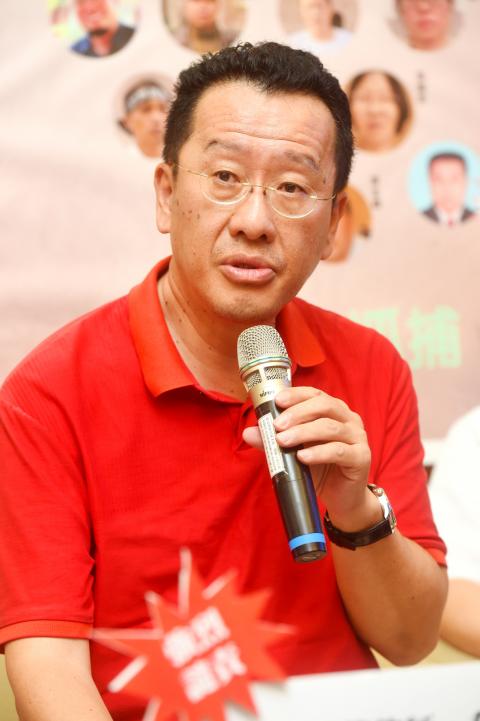Democratic Progressive Party (DPP) Legislator Wellington Koo (顧立雄) yesterday confirmed that he has agreed to head the Executive Yuan’s commission to handle the Chinese Nationalist Party’s (KMT) ill-gotten assets.
The commission is to be set up under the Act Governing the Handling of Ill-gotten Properties by Political Parties and Their Affiliate Organizations (政黨及其附隨組織不當取得財產處理條例), which was passed by the legislature late last month in a vote that was split along party lines.
According to the act, the premier is to appoint 11 to 13 members of the commission, who will be charged with investigating, retroactively confiscating and returning or restoring to rightful owners all assets that were improperly obtained by the KMT and affiliated organizations since Aug. 15, 1945 — when Japan officially announced its surrender to the Allies, bringing World War II to an end.

Photo: Chien Jung-fong, Taipei Times
Koo said he had not anticipated the appointment and had planned to push for several judicial, narcotics and prison reform bills in the legislature, but President Tsai Ing-wen (蔡英文) and Premier Lin Chuan (林全) had expressed their wishes for him to accept it.
“I can only tell you at this time that they said I was the right man for the job. When called on to shoulder such great responsibilities, there is no room for me to say no,” he said.
A commission to deal with illegitimately obtained party properties is “crucial to transitional justice, fair play between the political parties and deepening the nation’s democratization,” he added.
Koo said that as a lawmaker, he had worked hard to help draft the ill-gotten party properties law, and the legislation and the commission tasked with implementing the law were “unprecedented challenges for which it is impossible to ask others for guidance.”
The KMT should “let go of the party assets that are a hindrance to its rebirth,” Koo said, promising to carry out his new job “correctly and within the confines of the law.”
Koo was formerly a partner at Formosa Transnational Attorneys at Law and has served as director of the Taipei Bar Association, chairman of the Judicial Reform Foundation and chairman of the Taiwan Association for Human Rights.
Sources said that the Presidential Office and the Cabinet believe that Koo’s “mastery of the law, personal integrity and work ethic” would be important qualities for overseeing the effort to recover the private and public assets that the KMT is accused of having obtained during its years of authoritarian rule in Taiwan.
Koo will have to give up his legislator-at-large seat, as the Constitution bars serving lawmakers from concurrently holding a government post.
He will be replaced by former DPP legislator Julian Kuo (郭正亮), whose name was on the DPP legislator-at-large ballot in the Jan. 16 elections immediately after Koo’s.
However, Kuo’s return to the legislature could renew questions about his arrest in February on a drunk driving charge.
Additional reporting by Yang Chun-hui and CNA

Chinese Nationalist Party (KMT) Chairman Eric Chu (朱立倫), spokeswoman Yang Chih-yu (楊智伃) and Legislator Hsieh Lung-chieh (謝龍介) would be summoned by police for questioning for leading an illegal assembly on Thursday evening last week, Minister of the Interior Liu Shyh-fang (劉世芳) said today. The three KMT officials led an assembly outside the Taipei City Prosecutors’ Office, a restricted area where public assembly is not allowed, protesting the questioning of several KMT staff and searches of KMT headquarters and offices in a recall petition forgery case. Chu, Yang and Hsieh are all suspected of contravening the Assembly and Parade Act (集會遊行法) by holding

PRAISE: Japanese visitor Takashi Kubota said the Taiwanese temple architecture images showcased in the AI Art Gallery were the most impressive displays he saw Taiwan does not have an official pavilion at the World Expo in Osaka, Japan, because of its diplomatic predicament, but the government-backed Tech World pavilion is drawing interest with its unique recreations of works by Taiwanese artists. The pavilion features an artificial intelligence (AI)-based art gallery showcasing works of famous Taiwanese artists from the Japanese colonial period using innovative technologies. Among its main simulated displays are Eastern gouache paintings by Chen Chin (陳進), Lin Yu-shan (林玉山) and Kuo Hsueh-hu (郭雪湖), who were the three young Taiwanese painters selected for the East Asian Painting exhibition in 1927. Gouache is a water-based

Taiwan would welcome the return of Honduras as a diplomatic ally if its next president decides to make such a move, Minister of Foreign Affairs Lin Chia-lung (林佳龍) said yesterday. “Of course, we would welcome Honduras if they want to restore diplomatic ties with Taiwan after their elections,” Lin said at a meeting of the legislature’s Foreign Affairs and National Defense Committee, when asked to comment on statements made by two of the three Honduran presidential candidates during the presidential campaign in the Central American country. Taiwan is paying close attention to the region as a whole in the wake of a

OFF-TARGET: More than 30,000 participants were expected to take part in the Games next month, but only 6,550 foreign and 19,400 Taiwanese athletes have registered Taipei city councilors yesterday blasted the organizers of next month’s World Masters Games over sudden timetable and venue changes, which they said have caused thousands of participants to back out of the international sporting event, among other organizational issues. They also cited visa delays and political interference by China as reasons many foreign athletes are requesting refunds for the event, to be held from May 17 to 30. Jointly organized by the Taipei and New Taipei City governments, the games have been rocked by numerous controversies since preparations began in 2020. Taipei City Councilor Lin Yen-feng (林延鳳) said yesterday that new measures by